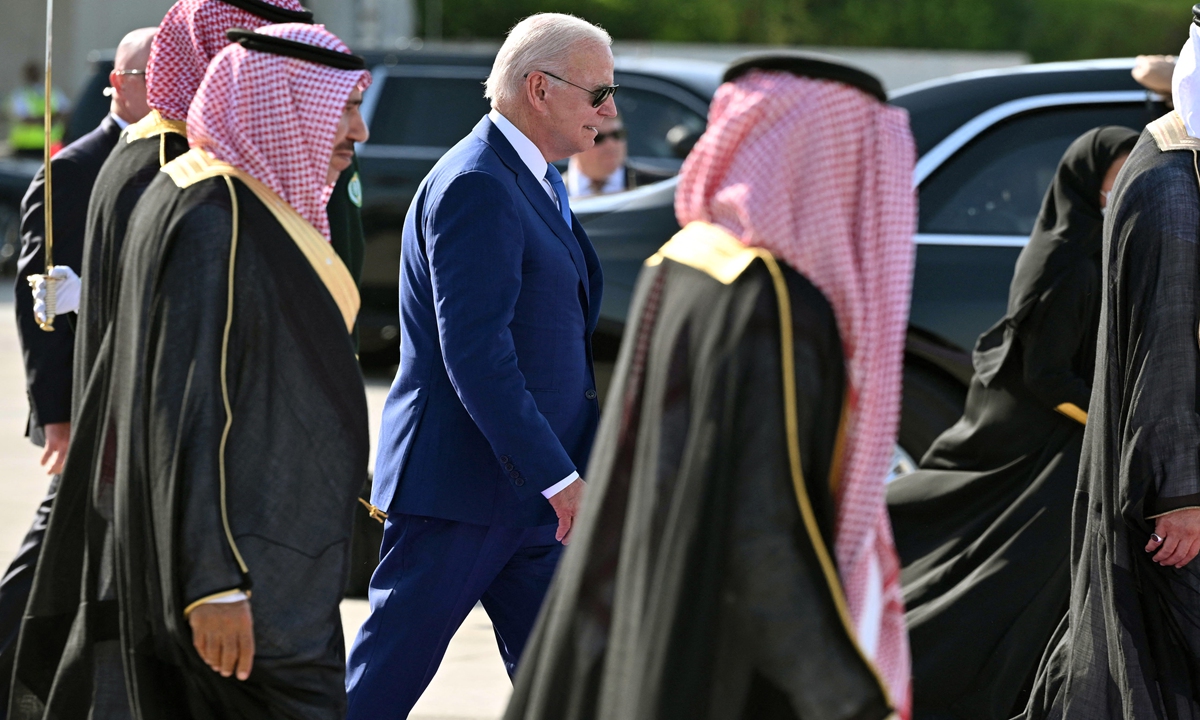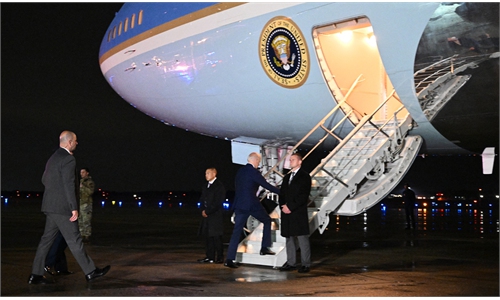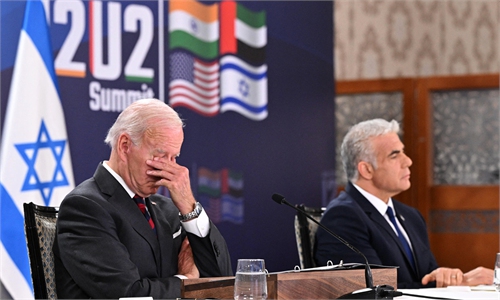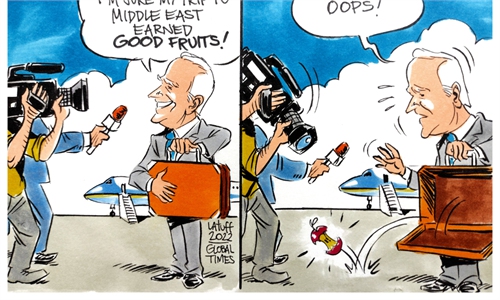Foreign Policy views China-Middle East ties through bloc confrontation, the last thing the region needs

US President Joe Biden boards Air Force One before departing from King Abdulaziz International Airport in the Saudi city of Jeddah on July 16, 2022, at the end of his first tour in the Middle East as president. Photo: AFP
"China Won't Replace the US in the Middle East," said Foreign Policy magazine on Wednesday, among a chorus of other US media outlets following President Joe Biden's trip in the region. As the talks about whether US is pivoting away from the Middle East are growing louder, Uncle Sam seemingly wishes to prove its leadership there again.
Foreign Policy made its point quite clear: Opportunistic China "remains uninterested in choosing sides in the region's ongoing power games." It argued that "Arab and Israeli concerns boil down to one overarching priority: containing Iran," and while "Beijing is uninterested in playing balance-of-power politics, let alone providing a security umbrella to the likes of Saudi Arabia and the United Arab Emirates," the US would continue to play a role in the game to oust Iran's leaders from power.
This is the typical logic of US-centrism. It shows when the US views China-Middle East relations, it sees the relationship only through its narrow-minded mentality. After the end of the Cold War, the US established its dominance in the Middle East, which is filled with hegemonism, power politics, infiltration and ideological values. More importantly, it consolidated its regional influence through bloc confrontation. The US believes this is the best model of foreign policy. As a result, when Foreign Policy analyzes China's role in the region, it adopted exactly the same logic and model of the US. This is poles apart from the reality.
If one can learn anything from the recent history of Middle East, there is one inescapable fact - the challenges confronted by Afghanistan, Iraq, Syria, Libya and other regional countries, are a mess left behind by US policies. How could any US media outlet possibly show off such an approach anymore? The result of the Biden's tour has only mirrored the fact that US credibility in the region is declining.
Compared with the US, China has a completely different path in dealing with Middle East countries. China focuses on friendship and cooperation. There has been no cultural penetration, no missionary work, but only friendly cooperation and joint works against colonialism and hegemonism.
China is not a "newcomer" in the Middle East. The link between the two has been around since the ancient Silk Road. As a country that had once suffered from colonialism, China cherishes national sovereignty and does not interfere in other countries' domestic affairs. This is the cornerstone of China-Middle East diplomacy.
In recent years, as China's strength has been growing, it has also increased its participation in Middle East affairs. But China's manner in such participation is completely different from that of the US. Engaging in bloc confrontation is not China's way. Rather, it attaches significance in promoting security through development. The China-raised Belt and Road Initiative is the manifestation of this. China believes that Middle East turmoil is a result of a lack of development and governance. Only by solving development problems can people achieve long-term peace and stability in the Middle East.
However, the logic of the US, just like what Foreign Policy suggests, is to solve the security puzzle in the Middle East by granting a security umbrella to one side and forming a military alliance to confront other regional countries. For instance, during Biden's tour this time, the US urged Arab countries to team up with Israel to counter Iranian missiles. This is typical confrontational and zero-sum thinking.
China has its own way to care about the security in the Middle East region. It has been taking part in various activities such as counter-terrorism and cracking down on pirates. China is also engaging in more and more cooperation with regional countries in areas such as de-radicalization and police training. These Chinese approaches differ from what Western countries do.
When Foreign Policy portrays China as an opportunist power, it exactly reveals that it is the US that is the true opportunist. The US cozies up to the Middle East only when it needs the region. Otherwise, Uncle Sam would simply ignore it.
At the moment, the US faces a dilemma. On the one hand, it wants to strategically pull itself out from the Middle East and focus on major power competition elsewhere. On the other hand, it needs the Middle East badly given the severe energy crisis. This is the background of Biden's trip. In other words, the US is becoming more and more utilitarian in its Middle East policy.
On Saturday, when asked about Biden's remarks that the US will not walk away from the Middle East and leave a vacuum to be filled by China, Russia or Iran, the Saudi Minister of State for Foreign Affairs Adel al-Jubeir said that "We build bridges with people; we don't see one as exclusive of the other…We want to be able to deal with everybody and we want to be able to engage with everybody." This shows that the Middle East countries have clear eyes.
US strength in the Middle East is indeed contracting. But for quite a long time, the US will still be the most influential external power in the region. This does not mean the US will play a constructive role. Rather, the US has been, and will wield its influence by creating chaos.
What Middle East countries need most now is to achieve domestic political reconciliation and explore a development path that suits them together. Amid regional competition and confrontation, they need a regional security framework and a regional economic development mechanism. Many of the challenges the Middle East is now facing are largely the problems left by the West. Concerning future development, the last thing they need is the zero-sum thinking of the US and bloc confrontation.
The article is compiled by Global Times reporter based on an interview with Liu Zhongmin, a professor at the Middle East Studies Institute of Shanghai International Studies University. opinion@globaltimes.com.cn



